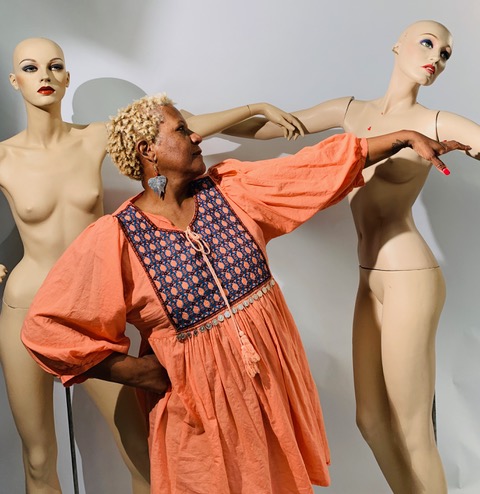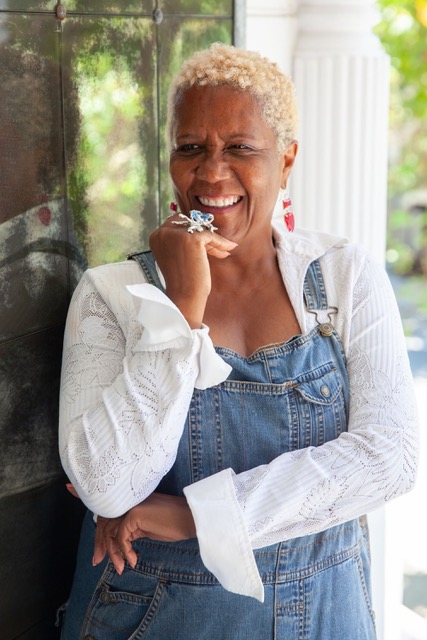Judi Henderson, owner of Mannequin Madness, now hopes for a sea change for Black people in the business world.

Judi Henderson, owner of Mannequin Madness, is hoping for a sea change for Black people in the business world. (Credit: Mannequin Madness)
Judi Henderson is a proud Black woman business owner. Being one wasn’t always an option.
Henderson’s Oakland, California business, Mannequin Madness, has been toughing out economic ups and downs for just about 20 years now. In 2019, she and her 4 employees and 4 contractors sold mannequins to clients here and abroad, raking in revenues that fell between $500,000 and $1 million, she says.
And today, she happily broadcasts her identity to customers, partners and the world. But “when I first started [Mannequin Madness], I must say, I made it a point to almost hide my ethnicity,” she says. “It’s what I felt I needed to do.”
She’s not alone — other women entrepreneurs of color have told us that they, too, hesitated to let customers know who they were (at least initially). Those business owners recalled concerns over alienating non-Black customers or pigeonholing themselves as a Black-only business unintentionally. In Henderson’s case, she launched her e-commerce store at a time when online shopping was far from the norm, and she “didn’t want any deterrent for someone who was already uncomfortable shopping online, [caused by] buying from a Black business owner.”
It wasn’t until years later that she became a visible part of her brand — though even then, it was less about choice and more about circumstance.
Broadcasting Blackness in Business
When she first started, Henderson says the deck was stacked against her on virtually every front — that “no one was going to loan a mannequin company money.” Nor was anyone going to invest. Professional investors in the tech-centric Bay Area weren’t interested — and even if they were, it’s exceedingly difficult for black women to secure venture capital. Research shows that less than 1 percent of VC funding goes to Black women entrepreneurs in a given year.
The disparities between the inter-generational wealth of white families and families of color hurt Henderson as well. “My ancestors couldn’t buy property in certain neighborhoods, so the value [of their homes] didn’t increase as much, so there was less to hand down,” she explains. “Even my own home, if I go to refinance that, many times I won’t get a loan, or I won’t get a favorable [interest] rate.” She described it as “starting already behind the 8 ball.”
But her bootstrapped business managed to grow steadily over the years, as it developed a reputation for quality and attracted international clients who “didn’t care that I was selling out of a backyard in Oakland.” She also began to receive business awards and grants from high-profile organizations like Wells Fargo and Intel.
Publication of those accolades meant circulation of her picture. But thanks to those achievements, Henderson became more comfortable letting customers know her Black identity. Still, her business primarily sells to white people — less than 10 percent of her clients are Black, she reports. So it’s “never been something I’m touting,” she says. In fact, “I’ve never even gotten my minority business certification.”
And like many industries, hers is dominated by white men. “I haven’t met another Black woman in the mannequin space, so there’s no one else to talk to,” she says. The problem even manifests itself in the orders she receives — Henderson has to “actively encourage stores” to carry mannequins bearing non-white features.
Staying Nimble
Of course, with brick-and-mortar now struggling to stay open, that has become a secondary concern. Because of the coronavirus crisis, Henderson says sales are down 50 percent from where they would be this time of year. Moreover, she’s had to suspend the in-person art classes she would host in her company’s warehouse space, further chipping away at Mannequin Madness’ income.
Indeed, after 20 tumultuous years — from launching around the time of the Sept. 11, 2001, terrorist attacks to weathering the 2008 recession and a 2014 divorce — she describes the events of 2020 as creating “the most difficult time ever” for her firm. “What’s happening now is like all three, in one,” she adds.

Being creative offers Judi Henderson of Mannequin Madness an outlet for the stress of running a business during a pandemic. But, she adds, “if I go out of business … I can’t just go to my family to ask for another million.” Systemic racism means “not having as much of a cushion, which creates a level of stress that’s just not healthy.” (Credit: Mannequin Madness)
Her ability to pivot amid the turmoil has shown her that she’s “resourceful in ways I didn’t think possible.” Part of her survival strategy has involved letting people rent her warehouse space for socially distanced pet photography. But with brick-and-mortar spaces closed, some permanently, the need for mannequins has simply decreased.
“It’s a struggle, but I’m able to be nimble,” Henderson says.
And it’s in this instance that she points to her Blackness as a boon, as she says Black people have a unique ability to “make a way out of no way.” She referenced the entrepreneurs of Tulsa’s Black Wall Street, who were devastated by a racist massacre in 1921. “They banded together and came back,” Henderson says, adding that resilience is “part of our genetic makeup.”
She continued that she’s “so used to the struggle, I forget that others don’t have to. It’s all that I’ve known.” Being creative offers her an outlet for the stress, she adds, but “if I go out of business … I can’t just go to my family to ask for another million” — systemic racism means “not having as much of a cushion, which creates a level of stress that’s just not healthy.”
What This Moment Could Mean
Henderson says she’s “so heartened” by ongoing international protests of racial inequality. But she wants to see lasting systemic changes come of it — for she and other Black business owners to have “more of a seat at the table,” rather than just, say, seeing customers “buying from Black-owned businesses every Juneteenth.”
She’s excited to see what “access and awareness” could lead to. “Now that people are paying more attention to minority businesses,” she wants to see inequalities addressed, rather than merely discussed — particularly when it comes to getting funded. Some companies, like women’s investment planning and investing firm Ellevest, are already leading the charge by finding and spotlighting companies to investors that advance racial justice causes and lift up women of color.
In the meantime, Henderson is creating collectives with other Black-owned businesses that operate outside the mainstream — either in the type of business they own, like the entrepreneur who runs a stained glass restoration business, or by being Black in spaces where Black people are a minority, like the owners of gymnastics clubs.
Community is key right now, she adds. “It’s extra hard to be a Black-owned business in a non-traditional field. It’s a whole other level of stress, and creativity, and resourcefulness.”
Article Credit: thestoryexchange.org
